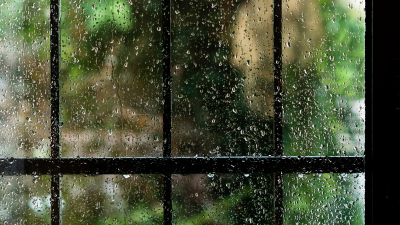
Have you ever heard someone tell you that rain causes windows to get dirty? This myth is common, but not actually true. If you’re a homeowner or business owner who prioritizes maintaining windows, here’s what you need to know about the truth of rainwater and how it affects your windows.
Myth: Rain Makes Windows Dirty
Contrary to popular belief, normal rainwater is relatively clean and doesn’t cause window staining. Rain can even help rinse light debris off clean windows.
Dirtiness after rain is usually due to preexisting grime, not the rain itself. Rain highlights existing dirt by clinging to particles like pollen, rust, and droppings that have attached to window glass over time.
Common Causes of Dirty Windows
So, if rainwater isn’t causing windows to become dirty, what is? Here are some of the common causes of dirty windows.
- Pollen: At certain times of year, pollen leaves a yellowish film on windows. Pollen often builds up in spring, summer, and early fall.
- Rust: Deteriorating window frames and their hardware can cause stubborn orange stains on window glass.
- Mineral Deposits: Mineral deposits on window glass come from hard water. These stains are similar to stains you may see on your shower doors and sink faucets.
- Bird Droppings: Birds leave droppings on window glass. This is a common, highly visible problem and should be removed quickly to prevent damage.
Why Clean Windows Stay Clear After Rain
After rain falls, clean windows continue to look clean. This is true because clean glass has no surface debris for rain to cling to. Rainwater evaporates when it lands on spotless windows.
Routine cleaning ensures rain won’t leave visible streaks or marks. Cleaning your windows twice each year will help you maintain a beautiful, spotless shine and a clear view outside your home or business.
Ideal Weather for Window Cleaning
The professionals at United Window Cleaning are available to clean windows year-round, including in the rain. However, some types of weather and outdoor conditions are less than ideal for window cleaning. Torrential downpours and lightning storms can make window cleaning more dangerous, while high winds make window cleaning less safe and effective.
The best conditions for window cleaning include partly cloudy or overcast days. Lack of direct sunlight on these days helps reduce streaking.
Cleaning windows on hot, sunny days can cause the glass to streak. If you must clean on a hot day, it’s best to do it at a time when there is no direct sunlight on the windows. Cleaning windows in the early morning or late afternoon hours can help.
Book with Confidence
The experienced team at United Window Cleaning adapts easily to seasonal changes and varying climates. If rescheduling is needed due to severe weather, you’ll be notified promptly.
Regular cleanings keep your windows looking great, regardless of the weather forecast. To get the most out of your window cleaning experience, contact United Window Cleaning to schedule your appointment today.


